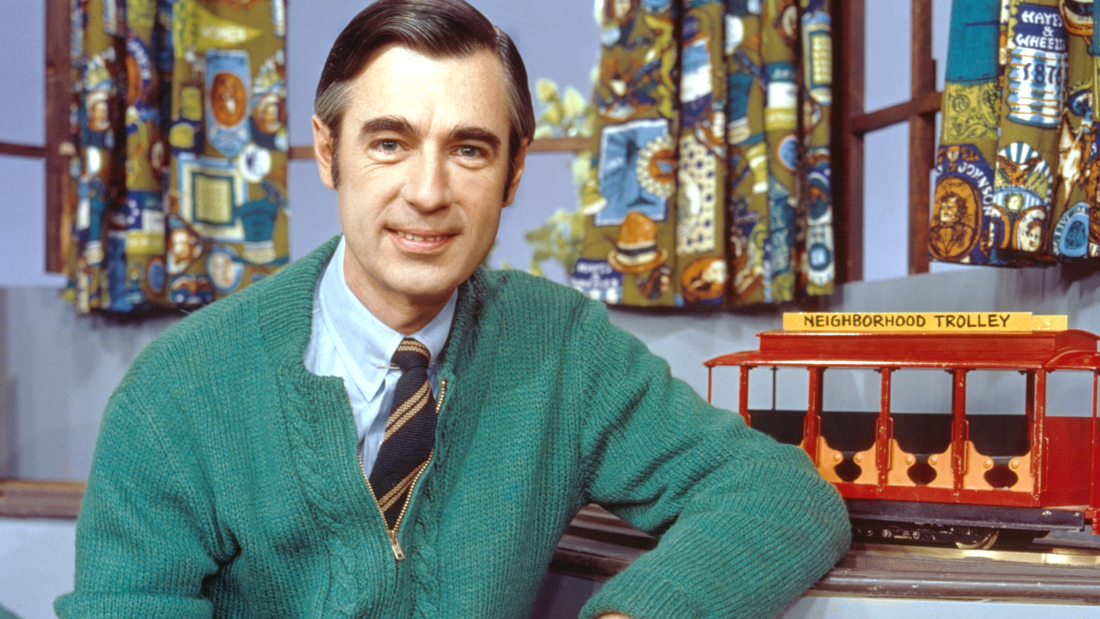As the credits started rolling on Won’t You Be My Neighbor?, I slowly got out of my seat. I saw the movie with a friend, eager and excited to discuss the beautiful documentary I just watched. As my mouth opened to say something, I…..simply couldn’t. Any words I tried to say would have been lost in incoherent babbling and tears. The tears and emotion were not of pain, however, but something beautiful. Something wonderful. Something simple: the feeling, as Mr. Rogers puts it “that you’re loved, and capable of loving.” Won’t You Be My Neighbor? is the showcase for this wonderful man, Mr. Fred Rogers, and his deep down belief of that basic principle and how important it was to teach every child this lesson everyday through his television program.
Mr. Rogers’ Neighborhood takes up a the majority of real estate of Won’t You Be My Neighbor? for good reason. After he was ordained by the church, they asked Mr. Rogers to find ways to communicate through the medium of television, cementing his destiny. Early on, we see our hero on his study in school of child psychology as well, and how appalled he was at the state of child’s TV programming in the US, so he set out to fix that problem. The documentary takes us through the show’s creation, and how specific elements of the show came into being. You learn that Mr. Rogers did all the voices of the characters in the “Land of Make-Believe,” and that most of them were (sometimes amusingly so) based on people he knew or parts of his own personality, which he used to get out the toughest lessons because it was easier for the puppet to say it than a person. What’s most amazing about the show is how unafraid Mr. Rogers was to tackle very divisive or tough subjects. His years of study made him realize that children have as deep of thoughts as adults, and it’s important to teach children through the prism of empathy what exactly was going on. In the first week of the show, the Neighborhood had to deal with a leader who wanted to build a wall to keep out outsiders, but the way to keep the wall down was through peace and non-violence. THE FIRST WEEK! But Mr. Rogers was unwavering in his mission, teaching children about sharing a pool with Officer Clemons, an African-American (a taboo at the time), or the Challenger disaster, or the death of a family member or a pet. For a child, all those things can sound so, so scary, but as Mr. Rogers correctly assumed, if you approach the subject from a safe place of love and empathy for the child, they will respond and learn and grow because they have within themselves the capacity to do so.
For documentaries like this around a single subject, the big goal director Morgan Neville has to accomplish is making sure we understand who Fred Rogers was. Normally, this means finding some “complexity” which usually means glaring fault or weakness. Amazingly, when looking at the life of Fred Rogers, it appears the complexity only makes him more exceptional. Underneath that sweet, simple exterior lies a determination that only the truly sensational possess. On the show, you’re not gonna put on week of shows about death without being sure of what you are doing. That type of devotion will always create threats from the outside; what’s ironic here, is that many of the threats come from TV, the very medium Mr. Rogers excelled in. When the Nixon Administration sought to eliminate PBS funding to be used for war and suppress TV messaging, our hero went to the Senate and spoke out on behalf of it, completely changing the mind of the hardened Senator John Pastore and earning the funding necessary to help promote education through public broadcasting. Many threatening messages are from people who project and warp Mr. Rogers’s overarching messages, such as condescending parodies on Saturday Night Live or Fox News demonizing watchers of his program for being too entitled and set up to realize they will never be sensational. But like any true hero, Mr. Rogers response was always the same: to deliver his message that all of these people were loved, and capable of loving. In the entitlement response, one of the highlights of the movie, Mr. Rogers simply states that every person WAS entitled….to the right to be loved, just a beautiful way to turn a message of hate back into a message of love and understanding. It’s also clear that these critics are very much in the minority. There’s a reverence and emotional euphoria around all of the talking heads in the documentary when they speak about Mr. Rogers, whether it be his kids talking about some of his parenting styles or the crew on the show talking about creatively debating with him, or the plethora of children talking to him in archived footage. Won’t You Be My Neighbor? makes it clear that Fred didn’t always win every battle (cruel children’s programming) or eliminate all evil from the world (9/11 was very hard on him), but his message does work for children, and can help provide kids a safe place to learn about all this evil without fear and respond with love and understanding.
By the time Won’t You Be My Neighbor? has concluded, you realize that you’ve just watched a story about a truly great man. Fred Rogers understood how to speak and connect with a child, and despite all attempts to drag him into a deep, dark cynical world, through his sheer force of will preached a message of the capability of love and learning to kids around the United States. Before this movie, my favorite number was 24. But Won’t You Be My Neighbor makes a serious case for 143: the number of letters for each word in the phrase “I Love You.”

